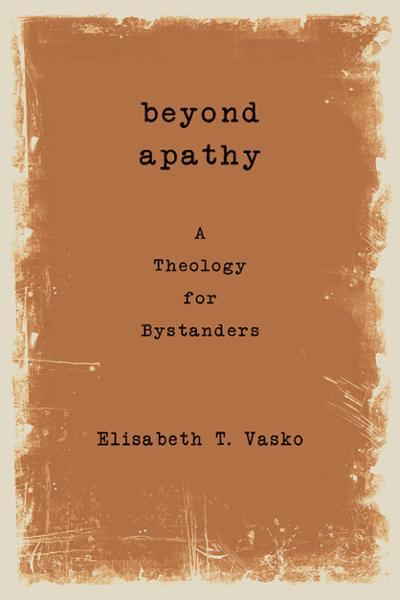Theological conversations about violence have typically framed the discussion in terms of victim and perpetrator. Such work, while important, only addresses part of the problem. Comprehensive theological and pastoral responses to violence must also address the role of collective passivity in the face of human denigration. Given the pervasiveness of inaction—whether in the form of denial, willful ignorance, or silent complicity—a theological reflection on violence that holds bystanders accountable, especially those who occupy social sites of privilege, is long overdue. In Beyond Apathy, Elisabeth T. Vasko utilizes resources within the Christian tradition to examine the theological significance of bystander participation in patterns of violence and violation within contemporary Western culture, giving particular attention to the social issues of bullying, white racism, and sexual violence. In doing so, she constructs a theology of redeeming grace for bystanders to violence that foregrounds the significance of social action in bringing about God’s kingdom.
- Publisher Fortress Press
- Format Paperback
- ISBN 9781451469295
- eBook ISBN 9781451494198
- Dimensions 6 x 9
- Pages 192
- Publication Date January 1, 2015
Endorsements
"Elisabeth Vasko courageously unmasks the 'normality of violence' that pervades our culture and shows why we must, therefore, understand God's redeeming grace in new ways. Hers is an important, urgent, and necessary theological vision for our times."
—Jon Nilson
Loyola University Chicago
"You might think that a book that tackles bullying and racism would be guaranteed to leave the reader despairing. Not this one. In Beyond Apathy, Elisabeth Vasko issues an irresistibly empathetic challenge to the many Americans who benefit from heteropatriarchy and white supremacy—often without intending or even realizing it. Refusing easy answers, she skillfully and courageously reimagines a breathtaking array of Christian symbols, holding out genuine hope that 'privileged bystanders' can learn to break through our apathy and act in compassionate solidarity with victims. A must-read."
—Karen Teel
University of San Diego
"Vasko makes a strong contribution to the very important, growing scholarly discussion about the moral obligations of persons who are socially privileged by virtue of gender, sex, or race. In addition to her skillful consideration of willful moral blindness about white racism or heterosexism, the book investigates other abuses, such as cyberbullying. The author's adept reading of the biblical story of Jesus and the Syro-Phoenician woman is a worthy example of the careful use of the Scriptures in Christian ethics. This is a valuable book for a broad Christian readership. Vasko's thoughts about Christian concepts—such as lament, sin and grace, divine impassibility, or solidarity and salvation—are uniquely useful ideas allowing Christians more clearly to perceive the bystander passivity of the privileged and to recognize the moral responsibilities of socially powerful Christians."
—Barbara H. Andolsen
Fordham University
—Jon Nilson
Loyola University Chicago
"You might think that a book that tackles bullying and racism would be guaranteed to leave the reader despairing. Not this one. In Beyond Apathy, Elisabeth Vasko issues an irresistibly empathetic challenge to the many Americans who benefit from heteropatriarchy and white supremacy—often without intending or even realizing it. Refusing easy answers, she skillfully and courageously reimagines a breathtaking array of Christian symbols, holding out genuine hope that 'privileged bystanders' can learn to break through our apathy and act in compassionate solidarity with victims. A must-read."
—Karen Teel
University of San Diego
"Vasko makes a strong contribution to the very important, growing scholarly discussion about the moral obligations of persons who are socially privileged by virtue of gender, sex, or race. In addition to her skillful consideration of willful moral blindness about white racism or heterosexism, the book investigates other abuses, such as cyberbullying. The author's adept reading of the biblical story of Jesus and the Syro-Phoenician woman is a worthy example of the careful use of the Scriptures in Christian ethics. This is a valuable book for a broad Christian readership. Vasko's thoughts about Christian concepts—such as lament, sin and grace, divine impassibility, or solidarity and salvation—are uniquely useful ideas allowing Christians more clearly to perceive the bystander passivity of the privileged and to recognize the moral responsibilities of socially powerful Christians."
—Barbara H. Andolsen
Fordham University
